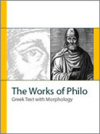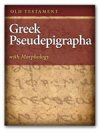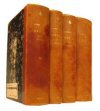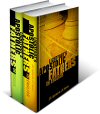Early Christian and Jewish Literature (12 vols.)
Digital Logos Edition
Overview
The Early Christian and Jewish Literature collection contains some of Logos’s best-loved pseudepigraphal, Apostolic Fathers, and early Jewish works. Containing thorough introductory content, morphological tagging, unique translations, and one-of-a-kind digital content spanning thousands of pages, these original Greek texts from Jewish culture in Jesus’ time, extra-biblical and early church writings, English translations, and commentary on the original text, is essential to students of theology, textual criticism, biblical history, culture—nearly every field relevant to Christian research. New introductions written by Logos resident scholars help guide the reader through the texts and their histories, and Logos’ powerful network of tools and datasets connect you to semantic context, philology, syntax, and morphology unlike any other.

- Old Testament Greek Pseudepigrapha with Morphology includes introductions that cover the significant features of each text
- The most complete collection of Greek Pseudepigrapha
- Preeminent critical edition of Josephus’ major works in Greek
- Lightfoot’s edition of Apostolic Fathers contains an extract from the Last Will and Testament of J.B. Lightfoot
- Lake’s edition of Apostolic Fathers addresses core theological questions
- Title: Early Christian and Jewish Literature
- Volumes: 12
- Language: Greek and English
- Resource Type: Ancient Texts and Translations
- Topic: Apostolic Fathers and Second Temple Judaism
This title is included in the following collections
You can save when you purchase this product as part of a collection.
Logos 5 Lutheran Gold Legacy L...
$849.99$849.99Unfiltered (Logos Special Edit...
$999.99$999.992025 Messianic Jewish Platinum
$1,499.99$1,199.99Logos 6 Orthodox Platinum Lega...
$1,499.99$1,499.99
- $1,499.99
- $2,999.99$2,249.99
- $2,999.99$2,249.99
- $3,149.99$2,362.49
- $2,999.99
- $2,999.99
- $4,749.99$3,562.49
- $4,749.99$3,562.49
- $4,749.99$3,562.49
- $4,749.99$3,562.49
- $4,899.99$3,674.99
- $4,749.99
- $4,749.99
- $4,749.99
- $7,749.99
- $7,749.99
- $11,399.99
- $23,999.99$17,999.99
- $21,749.99
- $24,999.99

The Works of Philo: Greek Text with Morphology
- Editors: Peder Borgen, Kåre Fuglseth, and Roald Skarsten
- Publisher: Lexham Press
- Publication Date: 2005
Imagine being able to ask questions of a first-century Hellenistic Jewish philosopher, a contemporary of Jesus and Paul who worked to understand Mosaic thought in light of Greek ideals. What kinds of questions would you ask to better understand the theology, interpretive strategies, and historical context of the biblical writers, who often wrestled with the same task?
The writings of Philo Judaeus, who lived in Alexandria, Egypt, between approximately 20 BC and AD 40, provide a fascinating glimpse into the world of Jesus and the Apostles. In fact, Philo’s works are a goldmine of information on Jewish exegetical methods, the worldview of the apostles, and theological matters of great importance for Christianity.
We are pleased to bring you the first electronic edition of the complete works of Philo in Greek, morphologically tagged. This resource is built upon the database compiled by the Norwegian “Philo Concordance Project,” which published the first complete, printed concordance of Philo in 2000. The Logos Bible Software resource includes the complete works of Philo, in Greek, drawn from the same four text editions used to compile the concordance (Cohn & Wendland, Colson, Petit, and Paramelle). The lemmatization and morphology are also supplied by the Philo Concordance Project scholars.

Old Testament Greek Pseudepigrapha with Morphology
- Authors: Michael S. Heiser and Ken Penner
- Publisher: Lexham Press
- Publication Date: 2008
- Pages: 1,537
The Pseudepigrapha are among the most important non-canonical texts for biblical study, second only to the Dead Sea Scrolls. Students of the Bible engage the literature of the Pseudepigrapha (Greek portions as well as those in Hebrew and Aramaic) because this material provides sharp insight into how the Jewish community of Jesus’ day approached and interpreted the Hebrew Scriptures.
Old Testament Greek Pseudepigrapha with Morphology includes morphologically tagged and lemmatized Greek texts for 81 books, letters, and fragments, making it the most complete electronic assemblage of Greek pseudepigraphal texts available! Currently, people who want to study the OT Greek Pseudepigrapha must track down and acquire dozens of critical editions in hard copy, scattered across libraries and publishers around the globe.
The Greek running text in the Logos edition is drawn from the best available scholarly editions in the public domain. All Greek texts have been morphologically tagged and lemmatized by Ken M. Penner, a project director and general editor for The Online Critical Pseudepigrapha project. Penner also helped prepare a number of the texts.
Several texts left out of other electronic editions on the market (e.g., Apocalypse of Daniel and the Psalms of Solomon) are included in the Logos edition! The Logos edition also includes brand new introductions, written by Michael Heiser. These introductions provide a summary of the significant features of each text and explain how each plays a role in biblical studies. More information and a list of included texts can be found here.

Josephus in Greek: Niese Critical Edition with Apparatus
- Authors: Flavius Josephus, Benedictus Niese, David Marshall, and Laura Noe
- Publisher: Lexham Press
- Publication Date: 2008
- Volumes: 6
- Pages: 2,102
Want more information on this unique edition of Josephus? Get more information here.
Edited by Benedict Niese, this authoritative edition, derived from various Greek manuscripts, features a critical apparatus that pinpoints the differences in the various manuscripts. Cross-references to Scripture and to the other works in the collection are also in abundance. Each work is preceded by an introductory preface, presented both in English and in Niese’s original Latin.
This is the first and only edition of Josephus’ works, electronic or otherwise, to feature Niese’s prefaces in English. The translation by David Noe was produced specifically for this edition.
Few authors have had as much influence on our understanding of the New Testament world as Josephus. His key works, The Antiquities of the Jews, The War of the Jews, Against Apion and the autobiographical Life have for centuries been scoured by scholars for their extensive historical and linguistical yield. These works, written from Josephus’ vantage as a first century Jewish historian and eye-witness to the first Jewish-Roman war, render an unparalleled depiction of the historical context in which Jesus and the Apostles lived and died. The impact Josephus has made on scholarship pertaining to the era of Christ cannot be overstated.

Apostolic Fathers in Greek and English (Lightfoot Edition)
- Author: J.B. Lightfoot
- Editor: J.R. Harmer
- Translator: J.B. Lightfoot
- Publisher: Macmillan & Co.
- Publication Date: 1898
- Volumes: 2
- Pages: 1,112
In this classic and highly influential collection, England’s Lord Bishop of Durham, J.B. Lightfoot, focuses all scholarly attention on the Apostolic Fathers, while making the texts accessible to a broader audience. The Logos edition will be complete with Lightfoot’s edition of the Greek, his English translation, and introductions.
How are the “Apostolic Fathers” different from the “Early Church Fathers?” In brief, the writings known as the Apostolic Fathers include only the texts thought to have been written by people who knew the Apostles or were one degree separated from them.
The Encyclopedia of Christianity explains the origins of the term thus, “The phrase ‘Apostolic Fathers’ goes back to a 1672 Paris edition prepared by JB Cotelier entitled Ss. Patrum qui temporibus apostolicis floruerunt … opera. This work contained Barnabas, 1 and 2 Clement, the epistles of Ignatius and Polycarp, Martyrdom of Polycarp, and Hermas. Although the historicity is debatable, the phrase has secured a place in historical study. It now applies also to Didache, the Epistle to Diognetus, the Quadratus Fragment, and the fragments of Papias.”
These early Christian writings shed light not only on theological developments, but on issues of canonicity, lexicography, and ecclesiology. They are cited extensively both in lexicons (e.g., BDAG and TDNT) and commentaries (e.g., NAC and WBC). BDAG, for example, contains nearly 2,500 references to the letters of Ignatius alone! Read more about the value of the Apostolic Fathers for biblical studies.
Joseph Barber Lightfoot was educated at Cambridge and Oxford, became the Lord Bishop of Durham in the Church of England, served as a minister in St. Paul’s Cathedral in London, and was professor of divinity at Cambridge University. He was also one of the original members of the New Testament Company of Bible Revisers. His other commentaries include volumes on Galatians and Philippians.
J.R. Harmer was the Lord Bishop of Rochester and Sometime Chaplain to the Bishop of Durham.

Apostolic Fathers in Greek and English (Lake Edition)
- Author: Kirsopp Lake
- Editors: Rick Brannan and G.P. Goold
- Publisher: Lexham Press
- Publication Date: 1912
- Volumes: 2
- Pages: 1,574
The writings of the Apostolic Fathers give a rich and diverse picture of Christian life and thought in the period immediately after New Testament times. These writings provide significant and unparalleled insight into the Christian movement during a critical transitional stage in its history and are a primary resource for the study of early Christianity.
These early Christian writings shed light not only on theological developments, but on issues of canonicity, lexicography, and ecclesiology. They are cited extensively both in lexicons (e.g., BDAG and TDNT) and commentaries (e.g., NAC and WBC). BDAG, for example, contains nearly 2,500 references to the letters of Ignatius alone! Read more about the value of the Apostolic Fathers for biblical studies.
How are the “Apostolic Fathers” different from the “Early Church Fathers?” In brief, the writings known as the Apostolic Fathers include only the texts thought to have been written by people who knew the Apostles or were one degree separated from them. English translations (Edinburgh Edition) of the Apostolic Fathers texts have been available for Logos Bible Software 4 as part of the Early Church Fathers collection, but the original Greek texts have not yet been published electronically for the system.
The Encyclopedia of Christianity explains the origins of the term thus, “The phrase ‘Apostolic Fathers’ goes back to a 1672 Paris edition prepared by JB Cotelier entitled Ss. Patrum qui temporibus apostolicis floruerunt … opera. This work contained Barnabas, 1 and 2 Clement, the epistles of Ignatius and Polycarp, Martyrdom of Polycarp, and Hermas. Although the historicity is debatable, the phrase has secured a place in historical study. It now applies also to Didache, the Epistle to Diognetus, the Quadratus Fragment, and the fragments of Papias.”
The Apostolic Fathers, with an English Translation by Kirsopp Lake
- From the Loeb Classical Library
- Edited by GP Goold
- First published 1912 by Harvard University Press, Cambridge
Contains brief introductions. This is the compact edition used for years by students everywhere.
Reviews
2 ratings

REV. DR. JAIME LOPEZ ORTEGA
2/2/2019
please produce english translations for the purely greek texts... i am having trouble and don't have the time unravel... thank you...Leonardo Buscemi
2/23/2017

Paul D. Nitz
2/17/2015
Being able to search more resources for Koine usage is good. An English translation for Philo reduces its usefulness considerably. It's surprising that Logos did not include it. Yonge's translation would be fine.Robert Misst
8/20/2014